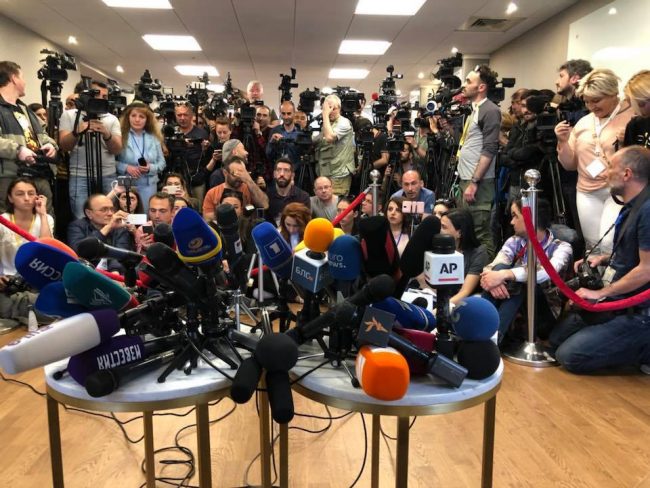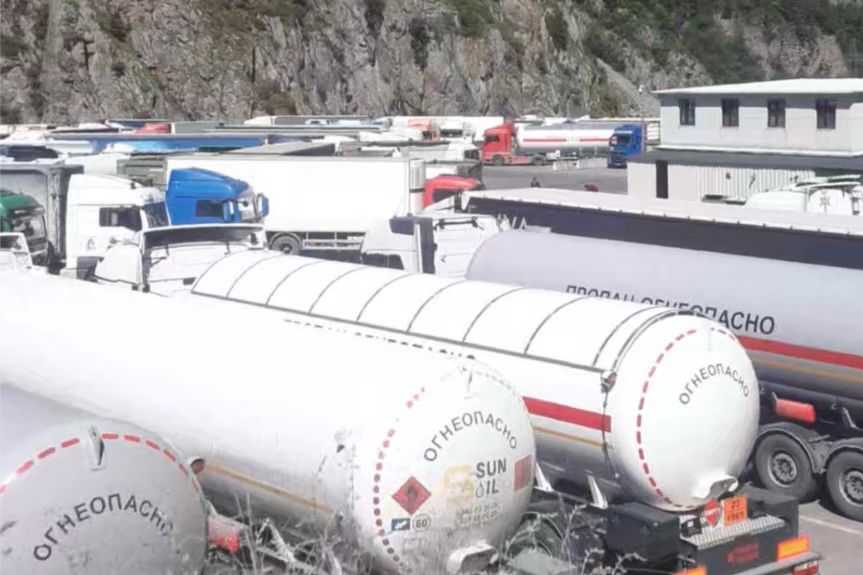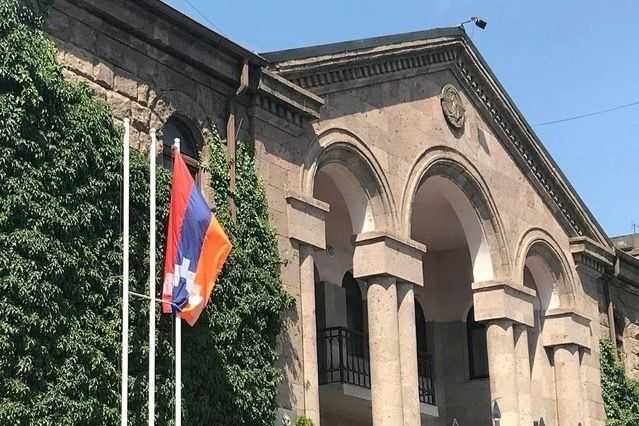

 Opposition leader Nikol Pashinyan has called for more anti-government protests on 1 May, when Armenia’s parliament, the National Assembly, is set elect a new prime minister. Acting PM Karen Karapetyan cancelled negotiations with Pashinyan set for noon on Friday, arguing the talks were ‘not aimed at achieving any result’. Pashinyan had insisted the talks, which he said were to negotiate the peaceful transfer of power, take place in front of journalists.
Opposition leader Nikol Pashinyan has called for more anti-government protests on 1 May, when Armenia’s parliament, the National Assembly, is set elect a new prime minister. Acting PM Karen Karapetyan cancelled negotiations with Pashinyan set for noon on Friday, arguing the talks were ‘not aimed at achieving any result’. Pashinyan had insisted the talks, which he said were to negotiate the peaceful transfer of power, take place in front of journalists.
Karapetyan’s spokesperson, Aram Araratyan, issued a statement saying ‘negotiations where one part dictates the agenda and the other cannot present an agenda at all are not actual negotiations’.
‘Moreover, Karen Karapetyan maintains the position that negotiations in front of cameras imply that these talks are not aimed at achieving any result. The acting Prime Minister believes that participating in negotiations that aren’t likely to bring results have no prospects’, the statement said.
Karapetyan suggested Pashinyan should accept the President Armen Sargsyan’s suggestion that all parliamentary and non-parliamentary powers ‘come together and discuss the current situation in the country and the ways to resolve it’.
On Thursday, Karapetyan, a former executive at Gazprom, spoke by phone with Russian President Vladimir Putin.
The Kremlin elaborated on the contents of the conversation in a statement.
‘It was noted that the crisis in Armenia must be resolved within the legal framework, in line with the existing constitution and on the basis of the results of the legitimate parliamentary elections held in April 2017. In this context, the leaders emphasised the importance of electing a new Armenian prime minister by the parliament on the planned date of May 1, 2018’, the statement reads.
‘The only legitimate candidate’
On Thursday, Pashinyan presented himself as the only legitimate candidate for prime minister, saying ‘there can be no compromise with the corrupt and anti-national system’.
‘I will either be elected prime minister through the people, by their demand, and with their support, or no prime minister at all will be elected in the republic of Armenia’, RFE/RL quoted as saying.
Pashinyan’s meeting with Karapetyan was canceled for the second time. The first meeting was scheduled for Wednesday morning, but was cancelled after Karapetyan refused to discuss Pashinyan’s key demands, including the appointment of a ‘people’s prime minister’.
During a press conference later that day, Karapetyan questioned the idea of a ‘people’s prime minister elected on the street’ and argued that early elections must be held to legitimise Pashinyan’s potential premiership.
The Armenian Revolutionary Federation (ARF), the ruling Republican Party’s junior coalition partner, pulled out of the coalition on Wednesday and called on parliament to elect a new prime minister ‘lawfully and within the framework of the constitution’.
The Republican Party still holds a majority of 58 seats of 105 in Armenia’s parliament, the National Assembly. The opposition, consisting of Tsarukyan’s Prosperous Armenia Party, the Yelk (Way Out) block, of which Pashinyan’s Civil Contract Party is a part, and the ARF, hold 47 seats in total. While Prosperous Armenia and all three party’s from the Yelk block have now declared their support for the protests, the ARF is still debating doing so.
Constitutional changes
Small protests loosely organised around the slogan ‘No to Serzh’ began in March. Since 13 April, tens of thousands have come out to the streets daily in what Pashinyan has called a ‘velvet revolution’. The protests were initially limited to opposing former president Serzh Sargsyan’s appointment as Prime Minister, but their demands have now expanded to include a new government from outside the ruling Republican Party, and new elections to be held under a new electoral code.
OSCE observers noted that the previous parliamentary elections, in 2017, were ‘tainted by credible information about vote-buying, and pressure on civil servants and employees of private companies’.
Following constitutional changes passed in 2015, Armenia’s parliament, the National Assembly, is now in charge of electing the prime minister. With Armenia’s shift from a semi-presidential to a parliamentary system, the prime minister is the most powerful position in the country.
Having previously played down suggestions he would run again for political office, Sargsyan, having served the maximum 10 years as president, announced on 11 April that he would seek the position of Prime Minister. On 17 April, he was sworn in as PM by Armenia’s parliament, the National Assembly.







